The transmedia narrative expansion of princess archetype in the board game Rebel Princess
DOI:
https://doi.org/10.24310/isl.19.1.2024.18068Keywords:
fairy tales, literary education, board games, artistic media, transmedia storytelling, rewritingAbstract
The card game Rebel Princess, understood as a transmedia expansion of the archetype of the princess and her actantial function in traditional fairy tales, is a paradigmatic example that can be framed within comparative studies on intermediality. For this reason, this paper hypothesises on the consideration of the language of modern narrative board games as a new artistic medium capable of establishing inter- and transmedial relationships that further expand the scope of the concept of reader intertext and affect the design of effective proposals for literary education. For this purpose, we start from a methodological design with a qualitative approach, whose instrument is built from the model of literary text analysis by Lluch and Sanz Tejeda (2021) and the transformational model of intermedial analysis by Pardo (2018). After its application, the results show the viability of the study of certain narrative games as artistic means of transmedia expansion different from those considered so far, with their own particularities of the need for active and interactive participation of the receiver in the multimodal narrative for its progress and completion. Indeed, it is evident that proposals such as Rebel Princess have the capacity to participate in decentralised constellations made up of narratives from different media, such as the literary or filmic, due to the inter- and transmedial contacts with a macro-universe of hypotextual references.
Downloads
Metrics
References
Ballester Roca, Josep y Jeroni Méndez Cabrera (2021). Los clásicos como resistencia: la lectura literaria en el marco de una educación lectora transmedia. Tejuelo, 34, 195-220. https://doi.org/10.17398/1988-8430.34.195
Byrne, Daniel, Gerardo Guerrero, Kevin Peláez y Tirso Virgós (2023). Rebel Princess. Zombi Paella.
Catalán, Antonio (2020). Los juegos de mesa modernos como fenómeno y artefacto cultural contemporáneo [Trabajo Fin de Máster]. Universitat Oberta de Catalunya. https://bit.ly/3ZD8EI6
Criado Aguilera, José Ismael y Mª Teresa Pérez Díaz (2022). La educación no formal e informal: entornos de aprendizaje necesarios para los nuevos retos sociales. Participación educativa, 9(12), 29-43. https://bit.ly/3teWskL
Ferreira, Carmen (2017). El personaje en el cuento maravilloso: la subversión de arquetipos femeninos de brujas, princesas y hadas. AILIJ (Anuario de Investigación en Literatura Infantil y Juvenil), 15, 41-56. https://bit.ly/3sMEFhl
Francescutti, Pablo (2019). La narración audiovisual como documento social e histórico: enfoques teóricos y métodos analíticos. Empiria. Revista de Metodología de Ciencias Sociales, 42, 137-161. https://doi.org/10.5944/empiria.42.2019.23255
García-Pedreira, Rocío (2023). El juego de roles ocultos como estrategia didáctica en el ámbito de la educación literaria. En Alba Souto Seijo, Isabel Dans Álvarez de Sotomayor, Gabriela Míguez Salina y Olata Santamaría Queiruga (Eds.), Experiencias y prácticas innovadoras en la formación de profesionales de la educación (pp. 95-115). Dykinson.
Gil, Maitê Moraes, Iris S. Pereira y Cristina Sylla (2023). La construcción del posicionamiento lector en una narrativa digital interactiva. Una discusión a la luz de la teoría de las multiliteracidades. Cultura, Lenguaje Y Representación, 30, 79-106. https://doi.org/10.6035/clr.6773
Gil, Antonio y Pedro Javier Pardo (2018). Intermedialidad. Modelo para armar. En Antonio Gil y Pedro Javier Pardo (Eds.), Adaptación 2.0. Estudios comparados sobre intermedialidad (pp. 12-38). Éditions Orbis Tertius.
Lluch, Gemma y Aránzazu Sanz-Tejeda (2021). Analizar relato #LIJ. Ediciones de la Universidad de Castilla-La Mancha.
López Noguero, Fernando (2002). El análisis de contenido como método de investigación. Revista de Educación, 4, 167-179. https://bit.ly/3ZF0wH1
López, Armando, Isabel Jerez y Eduardo Encabo (2015). Sobre nuevas alfabetizaciones lectoras. Las experiencias mediáticas integradas y los lectores navegantes. En Santiago Yubero y Elisa Larrañaga (Coords.), Propuestas socioeducativas para la alfabetización lectora. UCLM.
O'Halloran, Kay (2012). Análisis del discurso multimodal. ALED, 12(1), 75-97. https://doi.org/10.35956/v.12.n1.2012.p.75-97
Pardo, Pedro Javier (2018). De la transescritura a la transmedialidad: poética de la ficción transmedial. En Antonio Gil y Pedro Javier Pardo (Eds.), Adaptación 2.0. Estudios comparados sobre intermedialidad (pp. 41-92). Éditions Orbis Tertius.
Perla, Peter P. y ED McGrady (2011). Why Wargaming Works. Naval War College Review, 64(3), Art. 8. https://bit.ly/3RMyXdf
Piñeiro-Naval, Valeriano (2020). The content analysis methodology. Uses and applications in communication research on Spanish-speaking countries. Communication & Society, 33(3),1-15. https://doi.org/10.15581/003.33.3.1-15
Prieto, Julio (2017). El concepto de intermedialidad: una reflexión histórico-crítica. Pasavento. Revista de estudios hispánicos, V(1), 7-18. https://doi.org/10.37536/preh.2017.5.1.864
Rodríguez Martín, María Elena (2019). De la fidelidad al original a las narrativas transmedia: desarrollo y evolución de las teorías de adaptación. En Giovanna Pollarolo (Ed.), Cine/Literatura. Nuevas aproximaciones a viejas polémicas (pp. 39-61). Fondo editorial PUCP. https://doi.org/10.18800/9786123175030.002
Roig Rechou, Blanca-Ana y Rocío G-Pedreira (2019). ¿Alicia juzgada por la reina de corazones? Diferencias insalvables de la bilogía sobre Alicia de Lewis Carroll y la adaptación cinematográfica de Disney (1951). En Elisa Cámara Aguilera (Ed.), Traducciones, adaptaciones y doble destinatario en literatura infantil y juvenil (pp. 295-321). Peter Lang. http://dx.doi.org/10.3726/b15930
Rosendo Sánchez, Nieves y Domingo Sánchez Mesa (2019). Adaptación y transmedialidad: crítica de una oposición agotada. Pasavento: revista de estudios hispánicos, 7(2), 335-352. https://doi.org/10.37536/preh.2019.7.2.729
Rosendo Sánchez, Nieves (2016). Mundos Transmediales: Revisión Conceptual Y Perspectivas Teóricas Del Arte De Crear Mundos. ICONO 14. Revista Científica De Comunicación Y Tecnologías Emergentes, 14(1), 49-70. https://doi.org/10.7195/ri14.v14i1.930
Sánchez-Mesa Martínez, Domingo, Espen Aarseth, Robert Pratten y Carlos Scolari (2016). Transmedia (Storytelling?): A polyphonic critical review. Artnodes, 18, 8-19. https://doi.org/10.7238/a.v0i18.3064
Scolari, Carlos (2013). Narrativas transmedia. Deusto. https://doi.org/10.1515/sem-2013-0038
Wolf, Mark J. (2012). Building Imaginary Worlds: The Theory and History of Subcreation. Routledge.
Zombi Paella (s.f.). Quiénes somos. https://zombipaella.com/quienes-somos/?lang=es
Zombi Paella [@ZombiPaella] (17 de abril de 2023). Rebel Princess
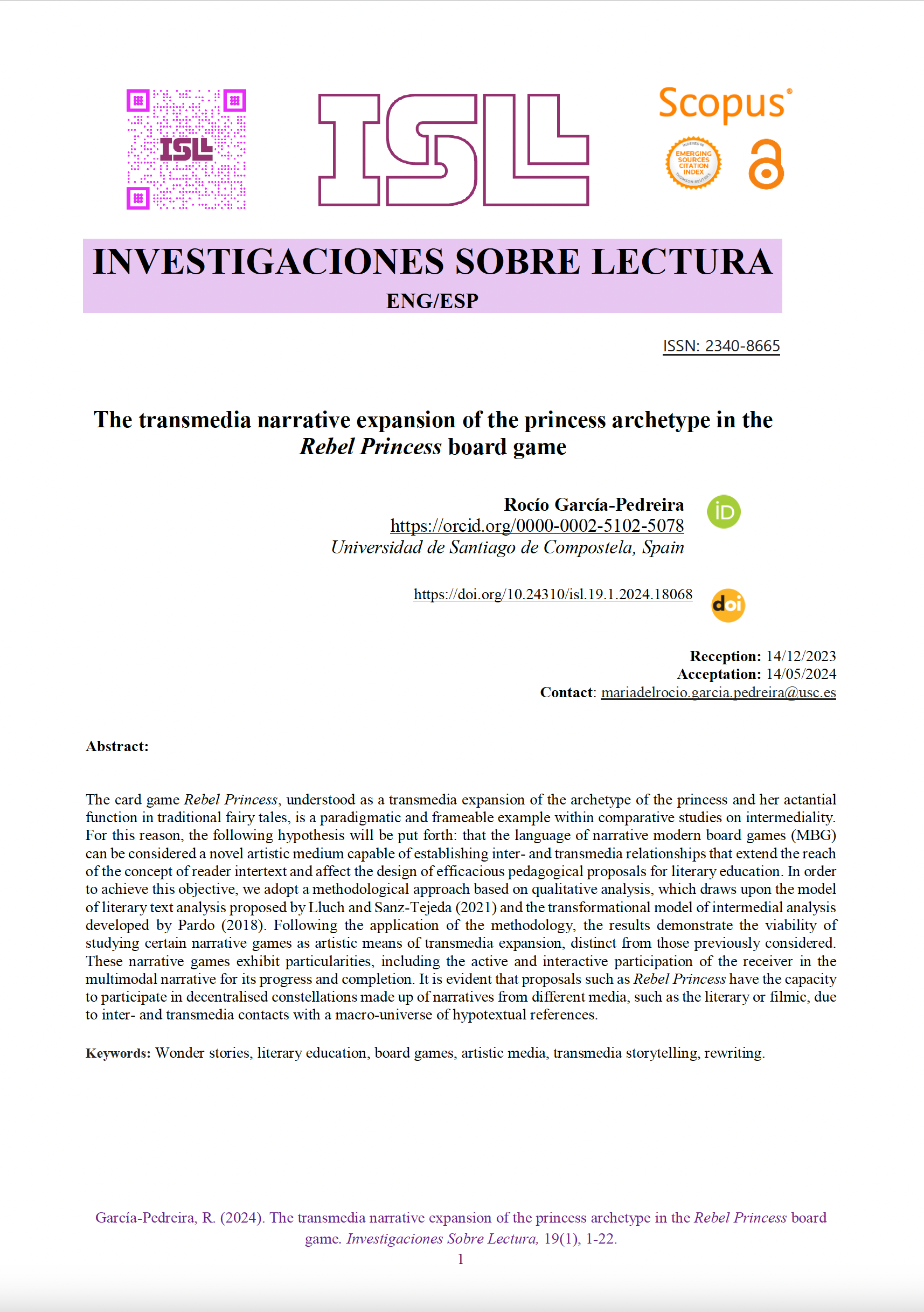
Downloads
Published
How to Cite
Issue
Section
License
Copyright (c) 2024 Rocío G-Pedreira

This work is licensed under a Creative Commons Attribution-NonCommercial-ShareAlike 4.0 International License.
All contents published in Investigaciones sobre Lectura are protected under the Creative Commons Attribution-NonCommercial-ShareAlike 4.0 International (CC BY-NC-SA 4.0) license. All about this license is available in the following link: <http://creativecommons.org/licenses/by-nc-sa/4.0>
Users can copy, use, redistribute, share and exhibit publicly as long as:
- The original source and authorship of the material are cited (Journal, Publisher and URL of the work).
- It is not used for comercial purposes.
- The existence of the license and its especifications are mentioned.
There are two sets of authors’ rights: moral and property rights. Moral rights are perpetual prerogatives, unrenounceable, not-transferable, unalienable, imprescriptible and inembargable. According to authors’ rights legislation, Investigaciones sobre Lectura recognizes and respects authors moral rights, as well as the ownership of property rights, which will be transferred to University of Malaga in open access. The property rights are referred to the benefits that are gained by the use or the dissemination of works. Investigaciones sobre Lectura is published in an open access form and it is exclusively licenced by any means for doing or authorising distribution, dissemination, reproduction, , adaptation, translation or arrangement of works.
Authors are responsable for obtaining the necessary permission to use copyrighted images.

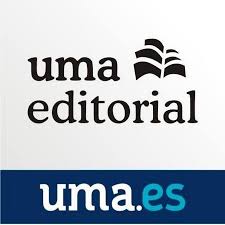
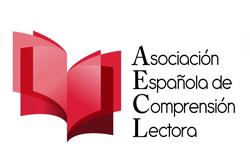
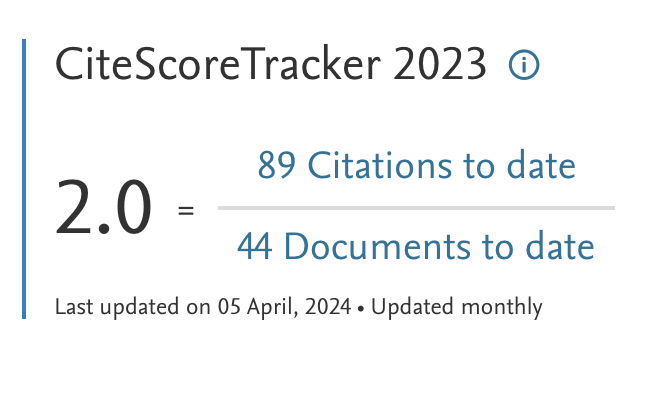
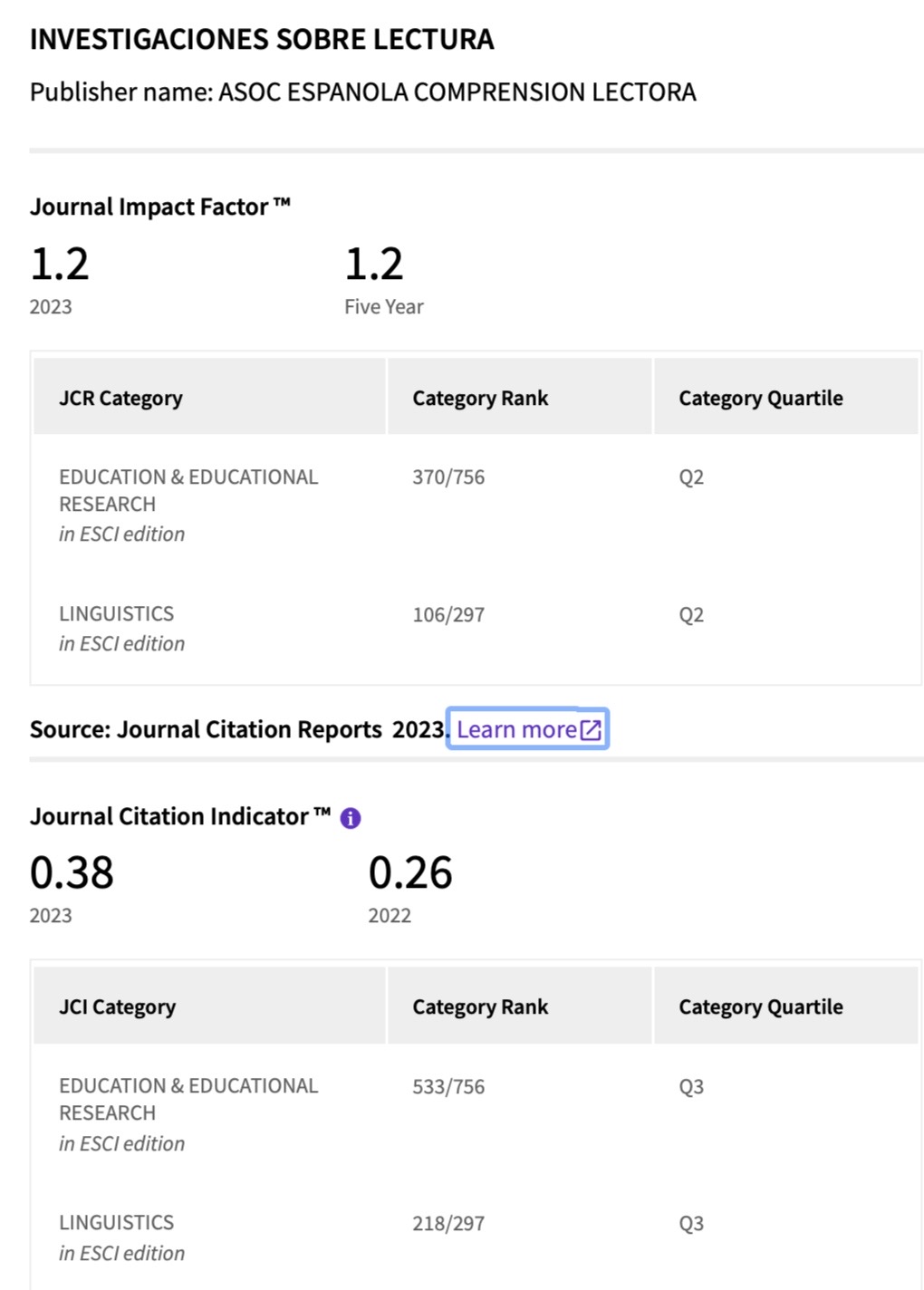
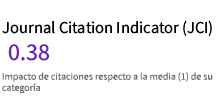
31.png)









